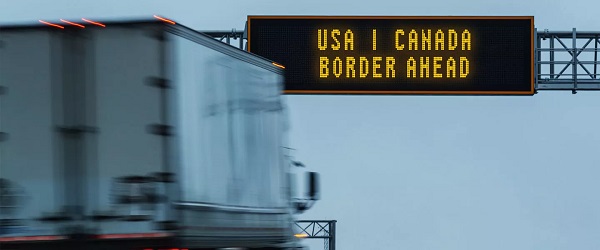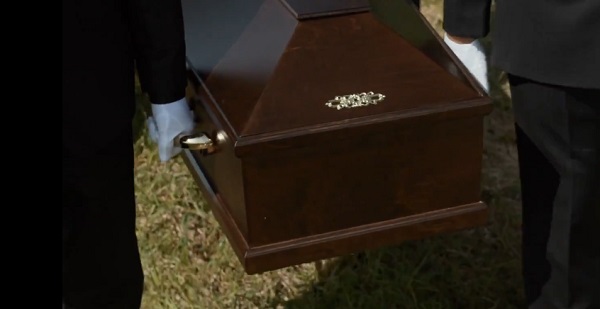Business
Trump and fentanyl—what Canada should do next

From the Fraser Institute
During the Superbowl, Doug Ford ran a campaign ad about fearlessly protecting Ontario workers against Trump. I suppose it’s effective as election theatre; it’s intended to make Ontarians feel lucky we’ve got a tough leader like Ford standing up to the Bad Orange Man. But my reaction was that Ford is lucky to have the Bad Orange Man creating a distraction so he doesn’t have to talk about Ontario’s high taxes, declining investment, stagnant real wages, lengthening health-care wait times and all the other problems that have gotten worse on his watch.
President Trump’s obnoxious and erratic rhetoric also seems to have put his own advisors on the defensive. Peter Navarro, Kevin Hassett and Howard Lutnick have taken pains to clarify that what we are dealing with is a “drug war not a trade war.” This is confusing since many sources say that Canada is responsible for less than one per cent of fentanyl entering the United States. But if we are going to de-escalate matters and resolve the dispute, we should start by trying to understand why they think we’re the problem.
Suppose in 2024 Trump and his team had asked for a Homeland Security briefing on fentanyl. What would they have learned? They already knew about Mexico. But they would also have learned that while Canada doesn’t rival Mexico for the volume of pills being sent into the U.S., we have become a transnational money laundering hub that keeps the Chinese and Mexican drug cartels in business. And we have ignored previous U.S. demands to deal with the problem.
Over a decade ago, Vancouver-based investigative journalist Sam Cooper unearthed shocking details of how Asian drug cartels backed by the Chinese Communist Party turned British Columbia’s casinos into billion-dollar money laundering operations, then scaled up from there through illicit real estate schemes in Vancouver and Toronto. This eventually triggered the 2022 Cullen Commission, which concluded, bluntly, that a massive amount of drug money was being laundered in B.C., that “the federal anti–money laundering [AML] regime is not effective,” that the RCMP had shut down what little AML capacity it had in 2012 just as the problem was exploding in scale, and that government officials have long known about the problem but ignored it.
In 2023 the Biden State Department under Anthony Blinken told Canada our fentanyl and money laundering control efforts were inadequate. Since then Canada’s border security forces have been shown to be so compromised and corrupt that U.S. intelligence agencies sidelined us and stopped sharing information. The corruption went to the top. A year ago Cameron Ortis, the former head of domestic intelligence at the RCMP, was sentenced to 14 years in prison after being convicted of selling top secret U.S. intelligence to money launderers tied to drugs and terrorism to help them avoid capture.
In September 2024 the Biden Justice Department hit the Toronto-Dominion Bank with a $3 billion fine for facilitating $670 million in money laundering for groups tied to transnational drug trafficking and terrorism. Then-attorney general Merrick Garland said “TD Bank created an environment that allowed financial crime to flourish. By making its services convenient for criminals, it became one.”
Imagine the outcry if Trump had called one of our chartered banks a criminal organization.
We are making some progress in cleaning up the mess, but in the process learning that we are now a major fentanyl manufacturer. In October the RCMP raided massive fentanyl factories in B.C. and Alberta. Unfortunately there remain many gaps in our enforcement capabilities. For instance, the RCMP, which is responsible for border patrols between ports of entry, has admitted it has no airborne surveillance operations after 4 p.m. on weekdays or on weekends.
The fact that the prime minister’s promise of a new $1.3-billion border security and anti-drug plan convinced Trump to suspend the tariff threat indicates that the fentanyl angle wasn’t entirely a pretext. And we should have done these things sooner, even if Trump hadn’t made it an issue. We can only hope Ottawa now follows through on its promises. I fear, though, that if Ford’s Captain Canada act proves a hit with voters, the Liberals may distract voters with a flag-waving campaign against the Bad Orange Man rather than confront the deep economic problems we have imposed on ourselves.
A trade dispute appears inevitable now that Trump has signaled the 25 percent tariffs are back on. The problem is knowing whom to listen to since Trump is openly contradicting his own economic team. Trump’s top trade advisor, Peter Navarro, has written that the U.S. needs to pursue “reciprocity,” which he defines as other countries not charging tariffs on U.S. imports any higher than the U.S. charges. In the Americans’ view, U.S. trade barriers are very low and everyone else’s should be, too—a stance completely at odds with Trump’s most recent moves.
Whichever way this plays out Canada has no choice but to go all-in on lowering the cost of doing business here, especially in trade-exposed sectors such as steel, autos, manufacturing and technology. That starts with cutting taxes including carbon-pricing and rolling back our costly net-zero anti-energy regulatory regime. In the coming election campaign, that’s the agenda we need to see spelled out.
How much easier it will be instead for Canadian politicians to play the populist hero with vague anti-Trump posturing. But that would be poor substitute for a long overdue pro-Canadian economic growth agenda.
Business
Liberal’s green spending putting Canada on a road to ruin

Once upon a time, Canadians were known for our prudence and good sense to such an extent that even our Liberal Party wore the mantle of fiscal responsibility.
Whatever else you might want to say about the party in the era of Jean Chrétien and Paul Martin, it recognized the country’s dire financial situation — back when The Wall Street Journal was referring to Canada as “an honorary member of the Third World” — as a national crisis.
And we (remember, I proudly served as Member of Parliament in that party for 18 years) made many hard decisions with an eye towards cutting spending, paying down the debt, and getting the country back on its feet.
Thankfully we succeeded.
Unfortunately, since then the party has been hijacked by a group of reckless leftwing fanatics — Justin Trudeau and his lackeys — who have spent the past several years feeding what we built into the woodchipper.
Mark Carney’s finally released budget is the perfect illustration of that.
The budget is a 400 page monument to deficit delusion that raises spending to $644.4 billion over five years — including $141.4 billion in new spending — while revenues limp to $583.3 billion, yielding a record (non-pandemic) $78.3 billion shortfall, an increase of 116% from last year.
This isn’t policy; it’s plunder. Interest payments alone devour $55.6 billion this year, projected to hit $76.1 billion by 2029-30 — more than the entire defence budget and rising faster than healthcare transfers.
We can’t discount the possibility that this will lead to a downgrade of our credit rating, which will significantly increase the cost of borrowing and of doing business more generally.
Numbers this big start to feel very abstract. But think of it this way: that is your money they’re spending. Ottawa’s wealth is made up entirely of our tax dollars. We’ve entrusted that money to them with the understanding that they will use it responsibly. In the decade these Liberals have been in power, they have betrayed that trust.
They’ve pursued policies which have made life in Canada increasingly unaffordable. For example, at the time of writing it takes 141 Canadian pennies (up from 139 a few days ago) to buy one U.S. dollar, in which all of our commodities are priced. Well, that’s .25 cents per litre of gasoline. Imagine what that’s going to do to the price of heating, of groceries, of the various other commodities which we consume.
And this budget demonstrates that the Carney era will be more of the same.
Of course, the Elbows Up crowd are saying the opposite — that this shows how fiscally responsible Mark Carney is, unlike his predecessor. (Never mind that they also publicly supported everything that Trudeau did when he was in government.) They claim that Carney shows that he’s more open to oil and gas than Trudeau was.
Don’t believe it.
The oil and gas sector does get a half-hearted nod in the budget with, for instance, a conditional pathway to repeal the emissions cap. But those conditions are important. Repeal is tied to the effectiveness of Carney’s beloved industrial carbon tax. If that newly super-charged carbon tax, which continues to make our lives more expensive, leads to government-set emissions reductions benchmarks being met, then Ottawa might — might — scrap the emissions.
Meanwhile, the budget doubles down on the Trudeau government’s methane emissions regulations. It merely loosens the provisions of the outrageous Bill C-59, an act which should have been scrapped in its entirety. And it leaves in place the Trudeaupian “green” super structure, which has resource sector investment, and any business that can manage it, fleeing to the U.S.
In these perilous times, with Canada teetering on the brink of recession, a responsible government would be cutting spending and getting out of the way of our most productive sectors, especially oil and gas — the backbone of our economy.
It would be repealing the BC tanker ban and Bill C-69, the “no more pipelines act,” so that our natural resources could better generate revenue on the international market and bring down energy rates at home.
It would quit wasting millions on Electric Vehicle charging stations; mandating that all Canadians buy EVs, even with their elevated cost; and pressuring automakers to manufacture Electric Vehicles, regardless of demand, and even as they keep closing up shop and heading south.
But in this budget the Liberals are going the opposite direction. Spend more. Tax more. Leave the basic Net-Zero framework in place. Rearrange the deck chairs on the Titanic.
They’re gambling tomorrow’s prosperity on yesterday’s green dogma, And every grocery run, every gas fill-up, every mortgage payment will serve as a daily reminder that we are the ones footing the bill.
Once upon a time, the Liberals knew better. We made the hard decisions and got the country back on its feet. Nowadays, not so much.
Business
Carney doubles down on NET ZERO

If you only listened to the mainstream media, you would think Justin Trudeau’s carbon tax is long gone. But the Liberal government’s latest budget actually doubled down on the industrial carbon tax.
While the consumer carbon tax may be paused, the industrial carbon tax punishes industry for “emitting” pollution. It’s only a matter of time before companies either pass the cost of the carbon tax to consumers or move to a country without a carbon tax.
Dan McTeague explains how Prime Minister Carney is doubling down on net zero scams.
-

 Health1 day ago
Health1 day agoLack of adequate health care pushing Canadians toward assisted suicide
-

 National1 day ago
National1 day agoWatchdog Demands Answers as MP Chris d’Entremont Crosses Floor
-

 Alberta1 day ago
Alberta1 day agoATA Collect $72 Million in Dues But Couldn’t Pay Striking Teachers a Dime
-

 Artificial Intelligence1 day ago
Artificial Intelligence1 day agoAI seems fairly impressed by Pierre Poilievre’s ability to communicate
-

 Media1 day ago
Media1 day agoBreaking News: the public actually expects journalists to determine the truth of statements they report
-

 Artificial Intelligence1 day ago
Artificial Intelligence1 day agoAI Faces Energy Problem With Only One Solution, Oil and Gas
-

 Business22 hours ago
Business22 hours agoLiberal’s green spending putting Canada on a road to ruin
-

 Business23 hours ago
Business23 hours agoCarney doubles down on NET ZERO











